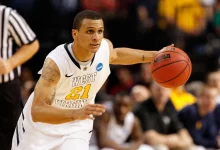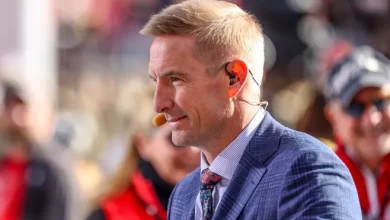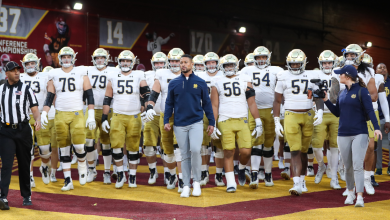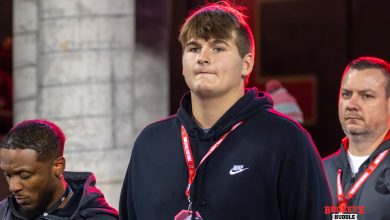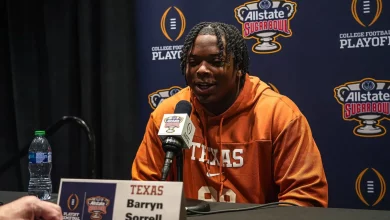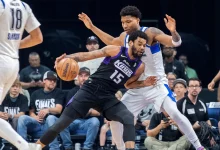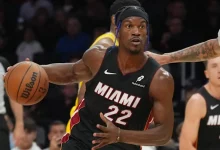Notre Dame’s Marcus Freeman Shares His Thoughts on Nico Iamaleava Leaving Tennessee
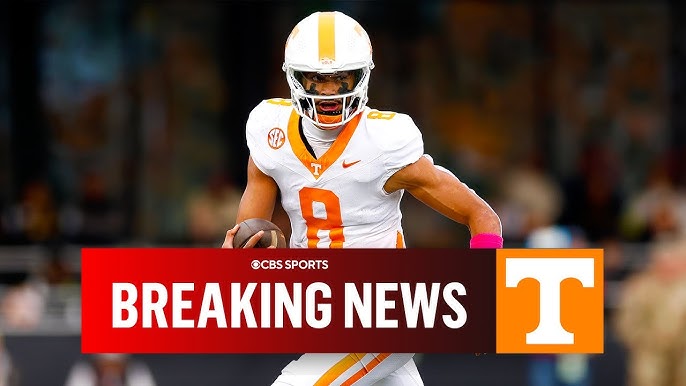
In college football, the transfer portal has altered the way teams are built, and one of the latest high-profile departures from the transfer portal is that of Nico Iamaleava, a quarterback from Tennessee who has decided to leave the Vols. Iamaleava, one of the most highly anticipated young quarterbacks in the country, has certainly sparked intrigue and generated debate across the football world, especially within coaching circles. As one of the most prominent figures in college football coaching today, Notre Dame’s head coach Marcus Freeman has shared his thoughts on the increasing trend of players leaving programs and how it impacts the fabric of college football.
The Transfer Portal: A Double-Edged Sword
Before diving into Freeman’s specific thoughts on Nico Iamaleava’s departure from Tennessee, it’s important to take a step back and understand the broader context of the transfer portal in college football. When the NCAA implemented the transfer portal in 2018, it was a landmark change in the world of college sports. The portal gave student-athletes more control over their futures, allowing them to transfer to new programs without sitting out a year as was previously required. For many, the portal was seen as a long-awaited victory in the ongoing debate about player rights and freedoms in a system that had often been accused of exploiting young athletes.
However, the portal’s rise has been a double-edged sword. On one hand, it has empowered athletes by giving them the freedom to change schools, find a better fit, and, in some cases, secure more playing time. On the other hand, it has created an increasingly fluid and volatile environment where rosters can change dramatically from year to year, forcing coaches to constantly adapt. This instability is especially problematic in a sport like college football, where success is built on strong relationships, team chemistry, and long-term planning.
For coaches like Freeman, the portal presents both an opportunity and a challenge. Coaches must learn to navigate this new reality, balancing the need for immediate talent with the risk of short-term gains undermining the stability of the program.
Nico Iamaleava: A High-Profile Transfer
Nico Iamaleava, who had a standout career as a high school quarterback and was considered one of the best prospects in the country, committed to Tennessee as part of an exciting future for the Volunteers. After enrolling in Knoxville, Iamaleava’s talent was immediately apparent. His arm strength, mobility, and poise under pressure made him a top contender for Tennessee’s starting quarterback position. However, despite his immense potential, the relationship between Iamaleava and Tennessee appears to have soured, leading to his decision to enter the transfer portal.
While the reasons behind Iamaleava’s decision remain somewhat unclear, his move has sparked debates about how the college football landscape is changing. Iamaleava’s departure from Tennessee brings up a number of important questions regarding team culture, commitment, and the broader impact of the transfer portal on a program’s stability. As someone deeply embedded in college football, Marcus Freeman has spoken candidly about the implications of moves like Iamaleava’s, recognizing both the potential benefits and the concerns they raise.
Marcus Freeman’s Philosophy on the Transfer Portal
Marcus Freeman, who became Notre Dame’s head coach in 2021, has seen firsthand the impact that the transfer portal can have on a program. Under Freeman’s leadership, Notre Dame has made significant strides in adapting to the ever-changing landscape of college football. Freeman has been proactive in embracing the portal when necessary but has also been firm in his belief that the most successful programs are those that foster long-term stability and build strong relationships between coaches and players.
Freeman’s approach to the transfer portal is a reflection of his broader coaching philosophy. A former player himself, Freeman values the importance of culture and cohesion within his teams. For Freeman, it’s not just about recruiting the most talented athletes or building the most high-profile roster; it’s about creating a program where athletes can develop both as players and as individuals. His philosophy revolves around trust, commitment, and developing a sense of belonging that transcends the lure of short-term success or fleeting opportunities.
Regarding transfers, Freeman has made it clear that while the transfer portal can provide immediate solutions to roster gaps or needs, he believes in taking a balanced approach. Freeman is not opposed to bringing in players through the portal, especially if they fit within the team’s culture and long-term vision. However, he has consistently emphasized that these transfers must align with Notre Dame’s values of excellence, discipline, and integrity.
“We want players who are committed to the process,” Freeman said in one of his early press conferences as head coach. “I’m all for helping guys who need a fresh start, but they need to understand that this is about more than just playing football. It’s about being a part of something bigger, something that lasts.”
The Broader Impact of Iamaleava’s Departure
While Freeman has not made any specific public statements about Nico Iamaleava’s decision to leave Tennessee, it’s clear that the departure of such a high-profile player carries broader implications for college football as a whole. In many ways, Iamaleava’s transfer encapsulates some of the biggest concerns coaches like Freeman have about the state of the game.
One of the biggest challenges posed by the current transfer portal system is the erosion of stability within college football programs. When a player like Iamaleava, a high-profile and highly recruited quarterback, decides to leave his initial school, it raises questions about how programs can maintain long-term success. The sport has long been predicated on building teams over years—establishing continuity, developing players, and fostering a sense of loyalty to the program. The transfer portal, in its current form, threatens to disrupt that stability.
“I don’t think we’re going to see teams that have sustained success if they’re constantly flipping players in and out,” Freeman remarked during a 2023 interview. “You can’t build a championship program if your roster is in constant flux. It’s the teams that can recruit and develop talent over time that will thrive, not just the teams that can bring in a bunch of transfers every year.”
Freeman’s comments reflect his concern that the portal encourages players to take the easy way out instead of sticking with a program through challenges and adversity. He also suggests that this revolving door of transfers might hurt the long-term development of players themselves. Rather than learning to fight for their place and contribute to a team over several years, players might opt for transfers at the first sign of competition or difficulty.
Cultural Fit: The Most Important Factor
One of the most important aspects of Freeman’s approach to recruiting and transfers is the concept of cultural fit. Notre Dame’s football program, steeped in tradition and rooted in strong academic and moral values, requires players to buy into a way of life that goes beyond just football. Freeman places a premium on finding players who align with these values and who will contribute positively to the culture of the team.
This concept of cultural fit is not only about bringing in talented players; it’s about ensuring that they understand and respect the traditions and expectations that come with playing for a program like Notre Dame. For Freeman, this is where the transfer portal can be both a blessing and a curse. A talented player like Iamaleava could bring immense value to a program, but Freeman’s belief in a cohesive and disciplined locker room suggests that he would be cautious about bringing in a player who might not fully embrace Notre Dame’s values.
“There’s a lot of talent out there, but it’s about more than just what they can do on the field,” Freeman explained. “We want guys who will be great players and great people. The culture of this program is non-negotiable, and it’s up to all of us to protect that.”
This philosophy is why Freeman is selective about how he approaches the transfer portal. While he’s open to bringing in talented players, he also recognizes the importance of ensuring that any additions complement the existing team dynamic. For Freeman, maintaining a strong, unified team culture is essential to success.
The Future of College Football and the Transfer Portal
The transfer portal has undoubtedly become a defining aspect of modern college football, and while it’s impossible to predict exactly how the landscape will evolve, it’s clear that figures like Marcus Freeman are at the forefront of the conversation. Coaches like Freeman, who understand both the game’s traditions and its present realities, will play a crucial role in shaping the future of college football.
As for Nico Iamaleava’s future, it’s uncertain where he will land after leaving Tennessee. But one thing is clear: the decision to transfer is just one of many choices he will make in his career, and how he handles this transition could have long-lasting effects on his development as a player.
Marcus Freeman’s views on the transfer portal and college football’s current state reflect the challenges facing not just Notre Dame but the entire sport. Freeman understands the need to embrace change and adapt to new realities, but he also believes in the importance of preserving the foundational principles that have made college football so special. For Freeman, it’s about finding the balance between adaptability and stability, between embracing new opportunities and staying true to what makes a program great.
As the transfer portal continues to evolve and reshape college football, coaches like Freeman will be pivotal in determining how these changes impact team culture, player development, and the long-term success of college programs. As for Iamaleava’s departure from Tennessee, it serves as a reminder that in the fast-paced world of modern college football, nothing is ever guaranteed—except, perhaps, the need for programs to remain adaptable and committed to their core values.


